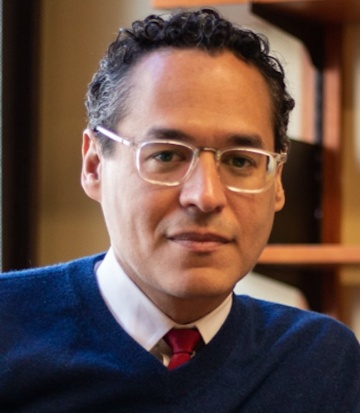Columbia College | Columbia University in the City of New York
Take Five with Roosevelt Montás ’95, GSAS’04

NATALIE GUERRA / COLUMBIA DAILY SPECTATOR
What were you like when you arrived at Columbia?
I grew up in a rural town in the Dominican Republic and came to the United States, not speaking English, six years before enrolling at Columbia. I attended local public schools in Queens, doing two years of bilingual education before being moved to “mainstream” for my freshman year of high school. I went to John Bowne H.S. in Flushing, which at the time boasted of being the most diverse high school in New York City. That claim didn’t mean anything to me — Bowne looked exactly like what I had seen of America up to that point. In fact, during my first months in the U.S., I wondered where all of the white people I expected to see in America were. (I first found them when my seventh-grade class went on a school trip to the Metropolitan Museum of Art and I emerged from the subway on the Upper East Side.) I applied to the College because I could not stomach the idea of uprooting myself again and leaving NYC, and because Columbia was reputed to be the hardest school to get into in New York. I did not know what the Ivy League was; I had not heard of the Core Curriculum; I did not know Columbia had a school of engineering and I almost applied to Columbia Engineering by mistake. Showing up as a freshman was my first immersion into mainstream American culture (to whatever quirky extent the College undergraduate culture can be described that way). What was I like? I was like a person who has woken up in the future and on a different planet.
What do you remember about your first-year living situation?
Everything. It’s one of the most vivid periods in my memory. I roomed in a tiny double in Schapiro (room 224), with my high school friend Marlon Lewis ’95, PH’98. I took Lit Hum with Wallace Gray, elementary French with Terry Gordon, fencing with Aladar Kogler, Spanish poetry with Philip Silver, Music Hum with Justin Davidson GSAS’90, SOA’94. During Orientation, I found a work-study job in the School of General Studies, which I kept all four years of college. I went home pretty much every Friday night and returned to campus Sunday evening, in time to watch Star Trek: Next Generation in the second-floor lounge. I didn’t mingle. I was painfully awkward.
What Core class or experience do you most remember, and why?
I made sense of my bewildering first-year experience through the Core, especially Lit Hum. Beginning with the Iliad, book after book, and class discussion after class discussion, clarified my world by complicating it; helped me center myself by disturbing my foundations. I carry this experience close to my heart now that I teach in the Core, knowing that for many others, too, the Core classroom is a place in which to begin to sort out a new and overwhelming world.
Did you have a favorite spot on campus, and what did you like about it?
There used to be a small Japanese maple tree of bonsai-like proportions on the lawn outside Lewisohn Hall, facing the sculpture of Pan, which is my favorite sculpture on campus. I loved to sit under this tree and read. The tree is no longer there, but was moved to the south side of Earl Hall, not far from the original spot. It’s still beautiful, but the new position next to a wall doesn’t do it justice. The long drooping branches of the tree formed a little alcove where one could sit in relative seclusion. I’d often sit there before or after going to work in the fourth floor of Lewisohn.
What, if anything, about your College experience would you do over?
One of the reasons I went to graduate school at Columbia was to experience some of the College in a way that was more assimilable and comprehensible to me. I had moved off campus after sophomore year and become a commuter student. I would not do that again; I would live on campus instead. I’d join more student groups. Maybe try to play baseball. I’d ask people I was curious to know about their lives and invite them on walks along Riverside Drive. But doing those things would have required that I be a different person than the boy who showed up for his HEOP summer program in July of 1991. And that’s not to be; nor am I sure I would want it to be.

